Legal Philosophy of Death Penalty: Arguments and Counterarguments
VerifiedAdded on 2023/01/17
|5
|1233
|39
Essay
AI Summary
This essay delves into the complex legal philosophy of the death penalty, presenting a balanced analysis of arguments for and against capital punishment. The essay begins by critiquing the death penalty, drawing upon Jeremy Bentham's social contract theory and highlighting potential injustices and costs associated with executions. It questions the morality of replicating a criminal's actions and emphasizes the fallibility of the justice system. The essay then pivots to defend the death penalty, exploring Kantian notions of regulative ideas, free will, and moral immutability. It argues that capital punishment serves as a deterrent and aligns with principles of justice. The essay concludes by referencing relevant literature to support its claims, providing a comprehensive overview of the ongoing debate surrounding the death penalty and its place within legal and ethical frameworks.
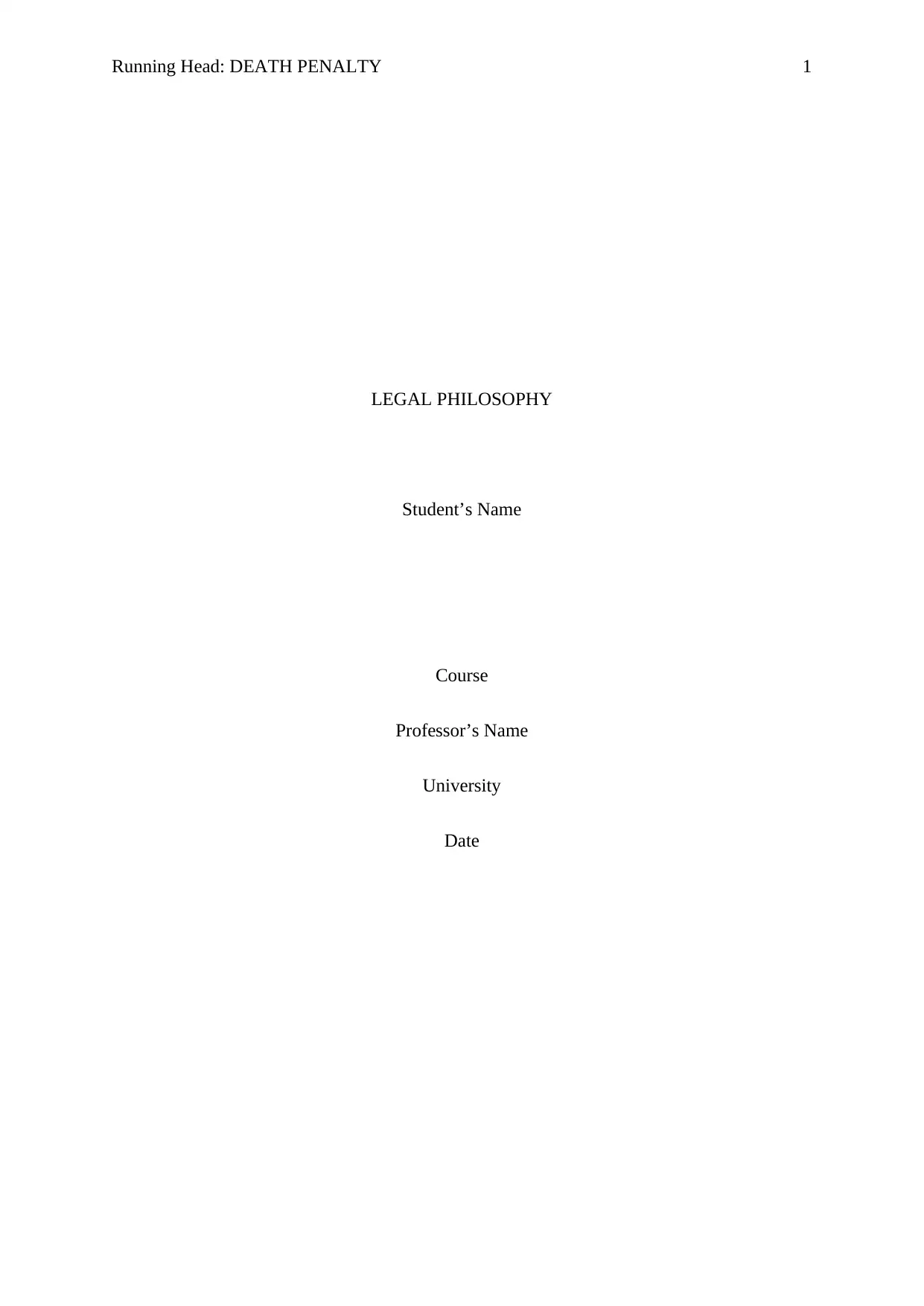
Running Head: DEATH PENALTY 1
LEGAL PHILOSOPHY
Student’s Name
Course
Professor’s Name
University
Date
LEGAL PHILOSOPHY
Student’s Name
Course
Professor’s Name
University
Date
Paraphrase This Document
Need a fresh take? Get an instant paraphrase of this document with our AI Paraphraser
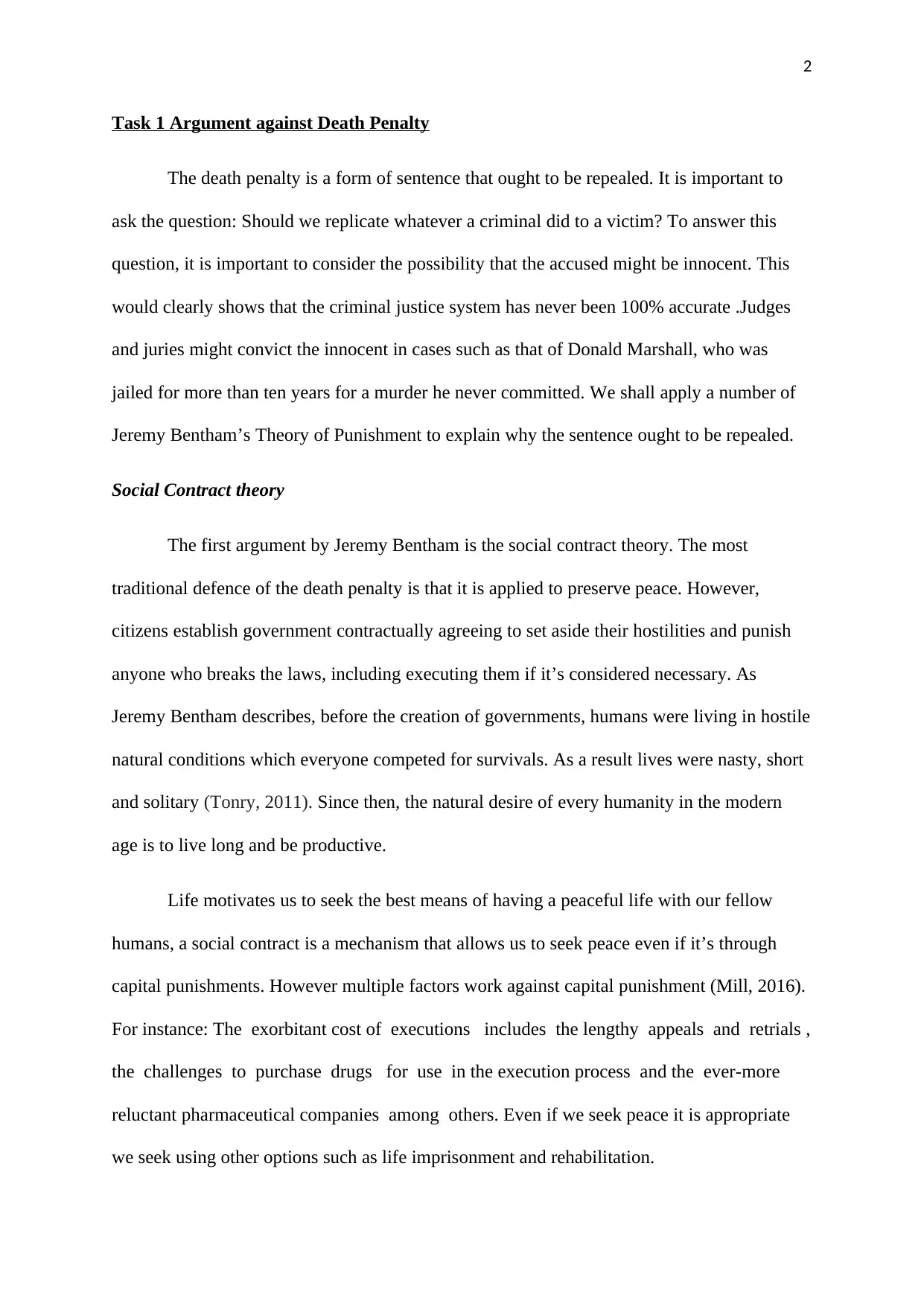
2
Task 1 Argument against Death Penalty
The death penalty is a form of sentence that ought to be repealed. It is important to
ask the question: Should we replicate whatever a criminal did to a victim? To answer this
question, it is important to consider the possibility that the accused might be innocent. This
would clearly shows that the criminal justice system has never been 100% accurate .Judges
and juries might convict the innocent in cases such as that of Donald Marshall, who was
jailed for more than ten years for a murder he never committed. We shall apply a number of
Jeremy Bentham’s Theory of Punishment to explain why the sentence ought to be repealed.
Social Contract theory
The first argument by Jeremy Bentham is the social contract theory. The most
traditional defence of the death penalty is that it is applied to preserve peace. However,
citizens establish government contractually agreeing to set aside their hostilities and punish
anyone who breaks the laws, including executing them if it’s considered necessary. As
Jeremy Bentham describes, before the creation of governments, humans were living in hostile
natural conditions which everyone competed for survivals. As a result lives were nasty, short
and solitary (Tonry, 2011). Since then, the natural desire of every humanity in the modern
age is to live long and be productive.
Life motivates us to seek the best means of having a peaceful life with our fellow
humans, a social contract is a mechanism that allows us to seek peace even if it’s through
capital punishments. However multiple factors work against capital punishment (Mill, 2016).
For instance: The exorbitant cost of executions includes the lengthy appeals and retrials ,
the challenges to purchase drugs for use in the execution process and the ever-more
reluctant pharmaceutical companies among others. Even if we seek peace it is appropriate
we seek using other options such as life imprisonment and rehabilitation.
Task 1 Argument against Death Penalty
The death penalty is a form of sentence that ought to be repealed. It is important to
ask the question: Should we replicate whatever a criminal did to a victim? To answer this
question, it is important to consider the possibility that the accused might be innocent. This
would clearly shows that the criminal justice system has never been 100% accurate .Judges
and juries might convict the innocent in cases such as that of Donald Marshall, who was
jailed for more than ten years for a murder he never committed. We shall apply a number of
Jeremy Bentham’s Theory of Punishment to explain why the sentence ought to be repealed.
Social Contract theory
The first argument by Jeremy Bentham is the social contract theory. The most
traditional defence of the death penalty is that it is applied to preserve peace. However,
citizens establish government contractually agreeing to set aside their hostilities and punish
anyone who breaks the laws, including executing them if it’s considered necessary. As
Jeremy Bentham describes, before the creation of governments, humans were living in hostile
natural conditions which everyone competed for survivals. As a result lives were nasty, short
and solitary (Tonry, 2011). Since then, the natural desire of every humanity in the modern
age is to live long and be productive.
Life motivates us to seek the best means of having a peaceful life with our fellow
humans, a social contract is a mechanism that allows us to seek peace even if it’s through
capital punishments. However multiple factors work against capital punishment (Mill, 2016).
For instance: The exorbitant cost of executions includes the lengthy appeals and retrials ,
the challenges to purchase drugs for use in the execution process and the ever-more
reluctant pharmaceutical companies among others. Even if we seek peace it is appropriate
we seek using other options such as life imprisonment and rehabilitation.
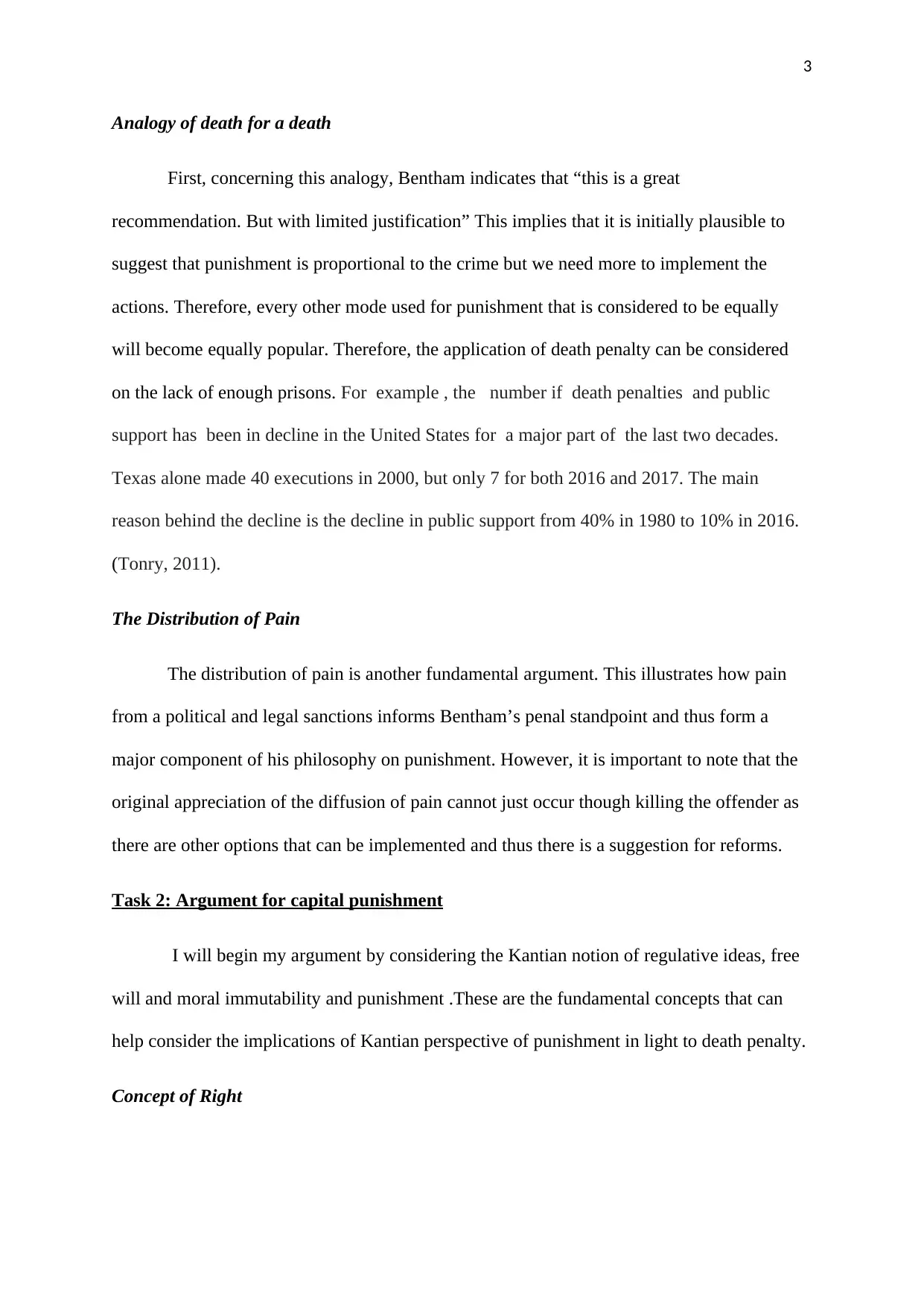
3
Analogy of death for a death
First, concerning this analogy, Bentham indicates that “this is a great
recommendation. But with limited justification” This implies that it is initially plausible to
suggest that punishment is proportional to the crime but we need more to implement the
actions. Therefore, every other mode used for punishment that is considered to be equally
will become equally popular. Therefore, the application of death penalty can be considered
on the lack of enough prisons. For example , the number if death penalties and public
support has been in decline in the United States for a major part of the last two decades.
Texas alone made 40 executions in 2000, but only 7 for both 2016 and 2017. The main
reason behind the decline is the decline in public support from 40% in 1980 to 10% in 2016.
(Tonry, 2011).
The Distribution of Pain
The distribution of pain is another fundamental argument. This illustrates how pain
from a political and legal sanctions informs Bentham’s penal standpoint and thus form a
major component of his philosophy on punishment. However, it is important to note that the
original appreciation of the diffusion of pain cannot just occur though killing the offender as
there are other options that can be implemented and thus there is a suggestion for reforms.
Task 2: Argument for capital punishment
I will begin my argument by considering the Kantian notion of regulative ideas, free
will and moral immutability and punishment .These are the fundamental concepts that can
help consider the implications of Kantian perspective of punishment in light to death penalty.
Concept of Right
Analogy of death for a death
First, concerning this analogy, Bentham indicates that “this is a great
recommendation. But with limited justification” This implies that it is initially plausible to
suggest that punishment is proportional to the crime but we need more to implement the
actions. Therefore, every other mode used for punishment that is considered to be equally
will become equally popular. Therefore, the application of death penalty can be considered
on the lack of enough prisons. For example , the number if death penalties and public
support has been in decline in the United States for a major part of the last two decades.
Texas alone made 40 executions in 2000, but only 7 for both 2016 and 2017. The main
reason behind the decline is the decline in public support from 40% in 1980 to 10% in 2016.
(Tonry, 2011).
The Distribution of Pain
The distribution of pain is another fundamental argument. This illustrates how pain
from a political and legal sanctions informs Bentham’s penal standpoint and thus form a
major component of his philosophy on punishment. However, it is important to note that the
original appreciation of the diffusion of pain cannot just occur though killing the offender as
there are other options that can be implemented and thus there is a suggestion for reforms.
Task 2: Argument for capital punishment
I will begin my argument by considering the Kantian notion of regulative ideas, free
will and moral immutability and punishment .These are the fundamental concepts that can
help consider the implications of Kantian perspective of punishment in light to death penalty.
Concept of Right
⊘ This is a preview!⊘
Do you want full access?
Subscribe today to unlock all pages.

Trusted by 1+ million students worldwide
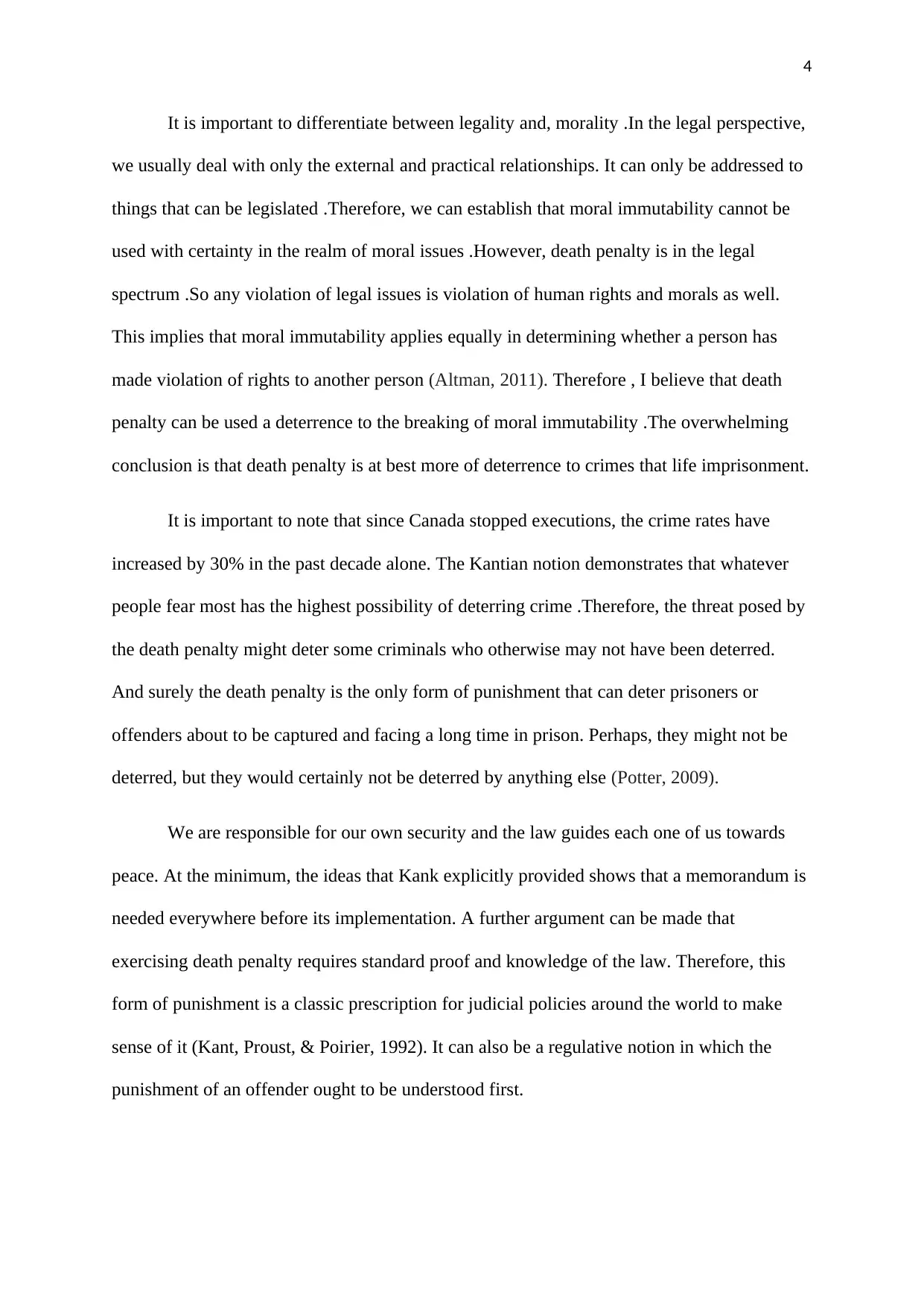
4
It is important to differentiate between legality and, morality .In the legal perspective,
we usually deal with only the external and practical relationships. It can only be addressed to
things that can be legislated .Therefore, we can establish that moral immutability cannot be
used with certainty in the realm of moral issues .However, death penalty is in the legal
spectrum .So any violation of legal issues is violation of human rights and morals as well.
This implies that moral immutability applies equally in determining whether a person has
made violation of rights to another person (Altman, 2011). Therefore , I believe that death
penalty can be used a deterrence to the breaking of moral immutability .The overwhelming
conclusion is that death penalty is at best more of deterrence to crimes that life imprisonment.
It is important to note that since Canada stopped executions, the crime rates have
increased by 30% in the past decade alone. The Kantian notion demonstrates that whatever
people fear most has the highest possibility of deterring crime .Therefore, the threat posed by
the death penalty might deter some criminals who otherwise may not have been deterred.
And surely the death penalty is the only form of punishment that can deter prisoners or
offenders about to be captured and facing a long time in prison. Perhaps, they might not be
deterred, but they would certainly not be deterred by anything else (Potter, 2009).
We are responsible for our own security and the law guides each one of us towards
peace. At the minimum, the ideas that Kank explicitly provided shows that a memorandum is
needed everywhere before its implementation. A further argument can be made that
exercising death penalty requires standard proof and knowledge of the law. Therefore, this
form of punishment is a classic prescription for judicial policies around the world to make
sense of it (Kant, Proust, & Poirier, 1992). It can also be a regulative notion in which the
punishment of an offender ought to be understood first.
It is important to differentiate between legality and, morality .In the legal perspective,
we usually deal with only the external and practical relationships. It can only be addressed to
things that can be legislated .Therefore, we can establish that moral immutability cannot be
used with certainty in the realm of moral issues .However, death penalty is in the legal
spectrum .So any violation of legal issues is violation of human rights and morals as well.
This implies that moral immutability applies equally in determining whether a person has
made violation of rights to another person (Altman, 2011). Therefore , I believe that death
penalty can be used a deterrence to the breaking of moral immutability .The overwhelming
conclusion is that death penalty is at best more of deterrence to crimes that life imprisonment.
It is important to note that since Canada stopped executions, the crime rates have
increased by 30% in the past decade alone. The Kantian notion demonstrates that whatever
people fear most has the highest possibility of deterring crime .Therefore, the threat posed by
the death penalty might deter some criminals who otherwise may not have been deterred.
And surely the death penalty is the only form of punishment that can deter prisoners or
offenders about to be captured and facing a long time in prison. Perhaps, they might not be
deterred, but they would certainly not be deterred by anything else (Potter, 2009).
We are responsible for our own security and the law guides each one of us towards
peace. At the minimum, the ideas that Kank explicitly provided shows that a memorandum is
needed everywhere before its implementation. A further argument can be made that
exercising death penalty requires standard proof and knowledge of the law. Therefore, this
form of punishment is a classic prescription for judicial policies around the world to make
sense of it (Kant, Proust, & Poirier, 1992). It can also be a regulative notion in which the
punishment of an offender ought to be understood first.
Paraphrase This Document
Need a fresh take? Get an instant paraphrase of this document with our AI Paraphraser
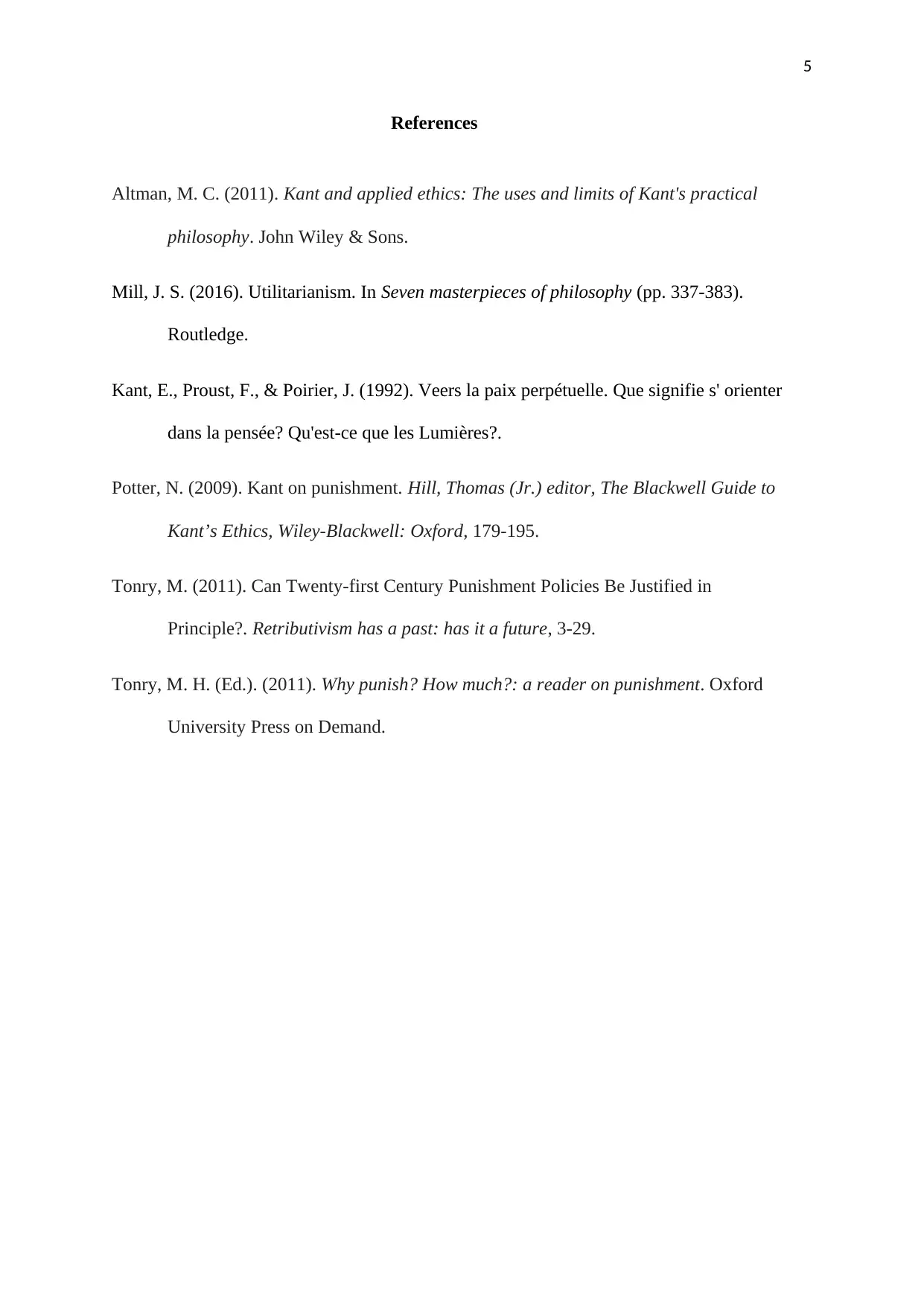
5
References
Altman, M. C. (2011). Kant and applied ethics: The uses and limits of Kant's practical
philosophy. John Wiley & Sons.
Mill, J. S. (2016). Utilitarianism. In Seven masterpieces of philosophy (pp. 337-383).
Routledge.
Kant, E., Proust, F., & Poirier, J. (1992). Veers la paix perpétuelle. Que signifie s' orienter
dans la pensée? Qu'est-ce que les Lumières?.
Potter, N. (2009). Kant on punishment. Hill, Thomas (Jr.) editor, The Blackwell Guide to
Kant’s Ethics, Wiley-Blackwell: Oxford, 179-195.
Tonry, M. (2011). Can Twenty-first Century Punishment Policies Be Justified in
Principle?. Retributivism has a past: has it a future, 3-29.
Tonry, M. H. (Ed.). (2011). Why punish? How much?: a reader on punishment. Oxford
University Press on Demand.
References
Altman, M. C. (2011). Kant and applied ethics: The uses and limits of Kant's practical
philosophy. John Wiley & Sons.
Mill, J. S. (2016). Utilitarianism. In Seven masterpieces of philosophy (pp. 337-383).
Routledge.
Kant, E., Proust, F., & Poirier, J. (1992). Veers la paix perpétuelle. Que signifie s' orienter
dans la pensée? Qu'est-ce que les Lumières?.
Potter, N. (2009). Kant on punishment. Hill, Thomas (Jr.) editor, The Blackwell Guide to
Kant’s Ethics, Wiley-Blackwell: Oxford, 179-195.
Tonry, M. (2011). Can Twenty-first Century Punishment Policies Be Justified in
Principle?. Retributivism has a past: has it a future, 3-29.
Tonry, M. H. (Ed.). (2011). Why punish? How much?: a reader on punishment. Oxford
University Press on Demand.
1 out of 5
Your All-in-One AI-Powered Toolkit for Academic Success.
+13062052269
info@desklib.com
Available 24*7 on WhatsApp / Email
![[object Object]](/_next/static/media/star-bottom.7253800d.svg)
Unlock your academic potential
Copyright © 2020–2026 A2Z Services. All Rights Reserved. Developed and managed by ZUCOL.
